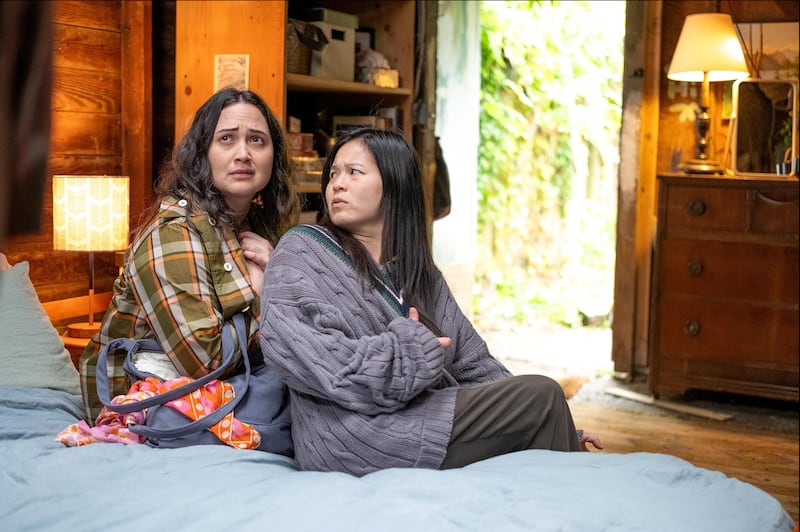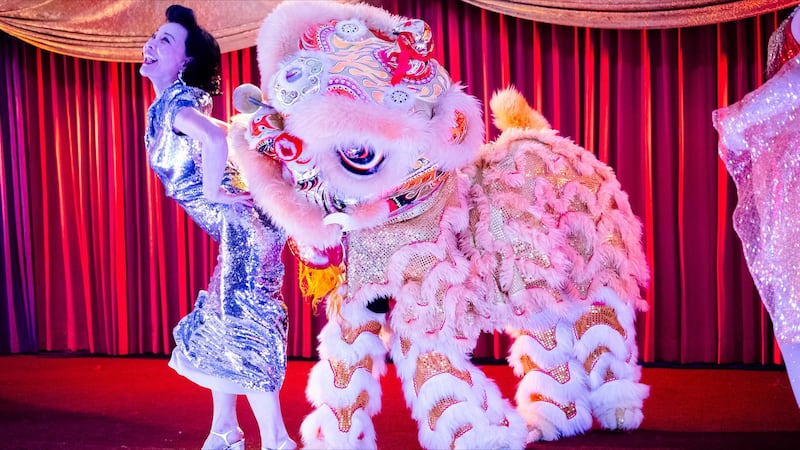Vanishingly few if any movies have had releases arranged around the episodic schedule of Saturday Night Live (maybe MacGruber, back in May 2010?) but by sheer coincidence The Wedding Banquet is arriving in theaters as SNL goes dark for two weeks in advance of its final run of Season 50 episodes.
This means that anyone jonesing for an additional dose of Bowen Yang, one of the brightest stars on the current version of the show, can spend this or next Saturday watching him stretch in a dramedy alongside Oscar nominee Lily Gladstone and Star Wars alum Kelly Marie Tran. The question The Wedding Banquet accidentally asks is why anyone would want to do this.
In theory, it makes a lot of sense. The film, co-written and directed by Andrew Ahn, is a remake of Ang Lee’s 1993 romantic dramedy about a queer son faking a straight marriage to please his visiting parents. In the 2025 version, Lee (Gladstone) and Angela (Tran) are living happily committed but unmarried in Lee’s family home, and trying to conceive a child via expensive IVF procedures.
Their friends and tenants, living in a converted garage, are longtime couple Chris (Yang) and Min (Han Gi-chan). Min’s student visa is about to expire, and the grandparents who raised him are about to call him back to Korea to help run the family business.

This movie taking place over 30 years after Lee’s original means that Min could, in fact, marry Chris for a green card. But Chris is noncommittal, allegedly spooked at the prospect of marrying for convenience, and so a more farcical solution is raised: Min will use some of his family wealth to pay for Lee and Angela’s IVF; in exchange, Angela will sham-marry him for money and immigration convenience. They have to fake it all in a hurry when Min’s grandmother (Oscar winner Youn Yuh-jung) arrives for an unexpected visit.
This sets the stage for some sociological farce. Or at least it seems to; if it feels like modern audiences might resist the idea that this level of deception would truly be necessary in 2025, they’ve got nothing on the movie itself, which ducks and dodges away from comedy at every opportunity, practically apologizing for even thinking about something like The Birdcage.
This might not be a shocker for Gladstone and Tran’s half of the storyline. Neither performer is really known for zaniness, and while it’s disappointing that they don’t get to try their hands at something newer here, it’s downright bizarre to cast Yang as a commitment-phobic, bird-watching, self-proclaimed screw-up and not let him have much fun performing any of those qualities.
Though Gi-chan’s character is arguably facing the biggest immediate life shake-up, he’s the only one of the four principals who doesn’t spend the movie acting kind of morose or maudlin. His occasionally daft reactions (like comparing Tran’s wedding makeup to Queen Amidala from Star Wars) have precisely the zing you might expect from his co-star.

That’s not to say Yang should never try his hand at more serious roles, as just about every successful Saturday Night Live cast member does at some point. (Even Kyle Mooney, who has a way of turning almost everything into a deadpan meta-comedy joke, got pretty sincere in Brigsby Bear.)
But in a movie that deals with the social mores of contemporary queerness (and is being advertised as some manner of comedy), Yang could be a major comic asset. Just last weekend, audiences could catch him repeating an SNL bit where he plays one half of a gay couple who becomes immediately and nonsensically indignant when straight friends wonder why they’ve suddenly shown up with an unannounced infant in tow.
That sketch, performed alongside Jon Hamm, wasn’t even vintage Yang; the show did it better two seasons ago pairing Yang with Adam Driver, as both men flew into a rage over being asked to clarify what they mean when they announce they’re “trying” for a baby. (No, they don’t mean adoption.)

But if his comic style sometimes threatens to become shtick (on SNL, whose doesn’t?), Yang is also one of the most distinct, voice-y, and purely hilarious performers they have, adept at pinpointing social phenomena and odd micro-cultural trends, then blowing them up into caricatured absurdity.
Think back to just a few episodes earlier, when he dueted with Lady Gaga, singing to a table of thirtysomethings about the slangy internet speak they really ought to banish from their vocabulary; “No More Slay” was the apt name. The Wedding Banquet doesn’t need to go sketch-comedy broad, but it’s not a coincidence that one of its few moments of comic life involves Yang and Tran waking up in bed together, naked and, in short order, appalled. Their mutual physical discomfort is very funny—they’re both allowed to find their characters through panic-dressing body language—and the movie could have used another half-dozen scenes with that level of accidental bedroom farce.
Ahn and Yang obviously disagree; they’ve run nearly this exact play before with Fire Island, a gay Pride and Prejudice riff that got way too in its own head about the emotional component of its story. That movie at least had a few broader, funnier scenes to buttress its soul-searching (though far fewer laughs than you might expect from a rom-com featuring both Yang and the very funny comedian Joel Kim Booster).

The Wedding Banquet feels like a corrective for anyone who thought the earlier movie was too mirthful. Tonally, it’s almost closer to Ahn’s Driveways, a lovely, gentle movie about a friendship between a young boy and an older neighbor. Banquet, meanwhile, is so gentle with its fully-grown characters that the intended niceness backfires. Yang and Tran in particular get so little opportunity for genuine irreverence or comic mishaps that their constant claims of being screw-ups wind up feeling narcissistic.
Tran and Gladstone at least get a beautifully, wordlessly acted scene toward the end of the film; Yang, though first-billed, is assigned neither gravitas nor comic relief. About to enter his seventh season on SNL, he might well be thinking about leaving at some point in the next few years, and his talent as a comedian and a writer could obviously take him in any number of directions. The disappointment of The Wedding Banquet suggests one that might be crossed off the list, at least for now.
The post ‘The Wedding Banquet’: Bowen Yang Is So Much Better Than His New Rom-Com appeared first on The Daily Beast.



















